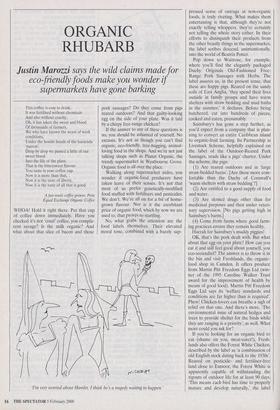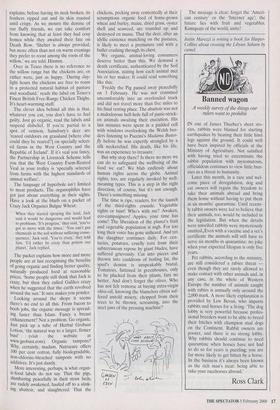ORGANIC RHUBARB
Justin Marozzi says the wild claims made for
eco-friendly foods make you wonder if supermarkets have gone barking
This coffee is easy to drink, It was fertilised without chemicals And also without cruelty.
Oh, it has taken the sweat and blood Of thousands of farmers, We who have known the worst of work conditions, Under the hostile hands of the hacienda 'patron'.
Drop by drop we passed a little of our sweet blood Into the life of the plant.
That is the bittersweet flavour You taste in your coffee cup.
Now it is more than that, Now it is the taste of liberty, Now it is the taste of all that is good.
A fair-trade coffee grower, Peru Equal Exchange Organic Coffee
WHOA! Hold it right there. Put that cup of coffee down immediately. Have you checked it's not 'cruel' coffee, you compla- cent savage? Is the milk organic? And what about that slice of bacon and those pork sausages? Do they come from pigs reared outdoors? And that guilty-looking egg on the side of your plate. Was it laid by a chirpy free-range chicken?
Tithe answer to any of these questions is no, you should be ashamed of yourself. No excuses. It's not as though you can't find organic, eco-friendly, tree-hugging, animal- loving food in the shops. And we're not just talking shops such as Planet Organic, the trendy supermarket in Westbourne Grove. Organic food is all over the place.
Walking along supermarket aisles, you wonder if organic-food producers have taken leave of their senses. It's not that most of us prefer genetically-modified food stuffed with fertilisers and pesticides. We don't. We're all on for a bit of home- grown flavour. Nor is it the exorbitant price of organic food, which by now we are used to, that proves so startling.
No, what grabs the attention are the food labels themselves. Their elevated moral tone, combined with a barely sup- Tm very worried about Hamlet, I think he's a tragedy waiting to happen.' pressed sense of outrage at non-organic foods, is truly riveting. What makes them entertaining is that, although they're not exactly telling whoppers, they're certainly not telling the whole story either, In their efforts to distinguish their products from the other beastly things in the supermarket, the label scribes descend, unintentionally, into the world of Beatrix Potter.
Pop down to Waitrose, for example, where you'll find the elegantly packaged Duchy Originals Old-Fashioned Free- Range Pork Sausages with Herbs. The label assures us, in the present tense, that these are happy pigs. Reared on the sandy soils of East Anglia, 'they spend their lives outside in family groups and have warm shelters with straw bedding and mud baths in the summer,' it declares. Before being butchered, cut into hundreds of pieces, cooked and eaten, presumably.
Sainsbury's has gone a step further, as you'd expect from a company that is plan- ning to convert an entire Caribbean island to organic-fruit farming. Its Partnership in Livestock Scheme, helpfully explained on the label of the Outdoor-Reared Pork Sausages, reads like a pigs' charter. Under the scheme, the pigs: (1) Are reared outdoors and in 'large straw-bedded barns'. [Are these more com- fortable than the Duchy of Cornwall's 'warm shelters with straw bedding'?] (2) Are entitled to a good supply of food and water.
(3) Are denied drugs other than for medicinal purposes and then under veteri- nary supervision. [No pigs getting high in Sainsbury's barns.] (4) Come from farms where good farm- ing practices ensure they remain healthy.
Hurrah for Sainsbury's muddy piggies!
OK, that's the pork dealt with. But what about that egg on your plate? How can you eat it and still feel good about yourself, you eco-scoundrel? The answer is to throw it in the bin and visit Freshlands, the organic- food shop in Camden. It offers produce from Martin Pitt Freedom Eggs Ltd (win- ner of the 1995 Caroline Walker Trust award for the improvement of health by means of good food). Martin Pitt Freedom Eggs Ltd says its 'welfare standards and conditions are far higher than is required'. Phew! Chicken-lovers can breathe a sigh of relief on that one. And there's more. 'The environmental issue of natural hedges and trees to provide shelter for the birds while they are ranging is a priority', as well. What more could you ask for?
If you're looking for an organic bird to eat (shame on you, meat-eater!), Fresh- lands also offers the Forest White Chicken, described by the label as 'a combination of old English, stock dating back to the 1930s'. Reared on pesticide- and fertiliser-free land close to Exmoor, the Forest White is apparently capable of withstanding the rigours of outdoor life for at least 90 days. 'This means each bird has time to properly mature and develop naturally,' the label explains; before having its neck broken, its feathers ripped out and its skin roasted until crispy. As we mourn the demise of our fluffy friends, we can take comfort from knowing that at least they had cosy homes while they awaited their fate on Death Row. 'Shelter is always provided, but more often than not on warm evenings they prefer to roost among the roots of the willow,' we are told. Hmmm.
Over in Tesco there is no reference to the willow range but the chickens are, or rather were, just as happy. 'During day- light hours the chickens are free to roam in a protected natural habitat of pasture and woodland,' reads the label on Tesco's Finest British Free-Range Chicken Thighs. It's heart-warming stuff.
The clever idea behind all this is that, whatever you eat, you don't have to feel guilty. Just go organic, read the labels and suspend disbelief. If you're partial to a spot of venison, Sainsbury's deer are 'reared outdoors on grassland [where else could they be reared?] on specially select- ed farms in the West Country and the Republic of Ireland'. If it's veal you fancy, the Partnership in Livestock Scheme tells you that the West Country Farm-Reared Veal in your trolley is 'specially selected from farms with the highest standards of animal welfare'.
The language of hyperbole isn't limited to meat products. The organophiles have got just about everything in their sights. Have a look at the blurb on a packet of Crazy Jack Organics Bulgur Wheat:
When they started spraying the land, Jack said it would be dangerous and would lead to problems. 'It's progress,' they said, 'you've got to move with the times.' 'You can't put chemicals in the soil without suffering conse- quences,' Jack said. 'You're crazy,' they told him, 'I'd rather be crazy than poison our planet,' Jack replied.
The packet explains how more and more people are at last recognising the benefits of going organic and finding better quality, naturally produced food at reasonable prices. 'Some people still think that Jack is crazy, but then they called Galileo crazy when he suggested that the earth revolved around the sun.' It sure makes you ponder.
Looking around the shops it seems there's no end to all this. From bacon to boob jobs, the organic message is spread- ing faster than Islam. Fancy a breast enhancement? Not a problem. Go organic. Just pick up a tube of Herbal Grobust Lotion, 'the natural way to a larger, firmer bust' (visit the website at www.grobust.com). Organic tampons? Why, certainly, madam. Natracare offers 100 per cent cotton, fully biodegradable, non-chlorine-bleached tampons with no additives. It's just dandy.
More interesting, perhaps, is what organ- ic-food labels do not say. That the pigs, Slumbering peacefully in their straw beds, are rudely awakened, hauled off to a stink- ing abattoir, and slaughtered. That the chickens, pecking away contentedly at their scrumptious organic feed of home-grown wheat and barley, maize, dried grass, oyster shell and seaweed, are rounded up and destroyed en masse. That the deer, after an idyllic existence munching on the pastures, is likely to meet a premature end with a bullet crashing through its chest.
We organic, animal-loving consumers deserve better than this. We demand a death certificate, authenticated by the Soil Association, stating how each animal met his or her maker. It could read something like this: 'Freddy the Pig passed away peacefully on 3 February. He was not crammed uncomfortably into an overloaded truck and did not travel more than five miles to his final resting place. The abattoir was not a malodorous hell-hole full of panic-strick- en animals awaiting their execution. His last minutes were spent in a padded cell with windows overlooking the Welsh bor- ders listening to Puccini's Madama Butter- fly before he was expertly strangled by a silk neckerchief. His death, like his life, was an experience to treasure.'
But why stop there? Is there no more we can do to safeguard the wellbeing of the food we eat? We blab endlessly about human rights across the globe. Animal rights, too, are regularly invoked by well- meaning types. This is a step in the right direction, of course, but it's not enough. There's something missing.
The time is ripe, readers, for the launch of the third-rights crusade. Vegetable rights or bust! Who's with me? Awaken, eco-campaigners! Apples, your time has come! The liberation of the planet's fruit and vegetable population is nigh. For too long their voice has gone unheard. And yet
the slaughter continues daily. For cen- turies,, n es, potatoes, cruelly torn from their subterranean repose by giant blades, have suffered grievously. Cut into pieces and thrown into cauldrons of boiling fat, the spud's demise is unspeakably brutal. Tomatoes, fattened in greenhouses, only to be plucked from their plants, fare no better. And don't forget the olives. Who has not felt remorse at buying extra-virgin olive-oil, knowing the blameless olives suf- fered untold misery, chopped from their trees to be thrown, screaming, into the steel jaws of the pressing machine? The message is clear: forget the 'Ameri- can century' or the 'Internet age'; the future lies with fruit and vegetables. Kumquats of the world, unite!
Justin Marozzi is writing a book for Harper- Collins about crossing the Libyan Sahara by camel.



























































 Previous page
Previous page